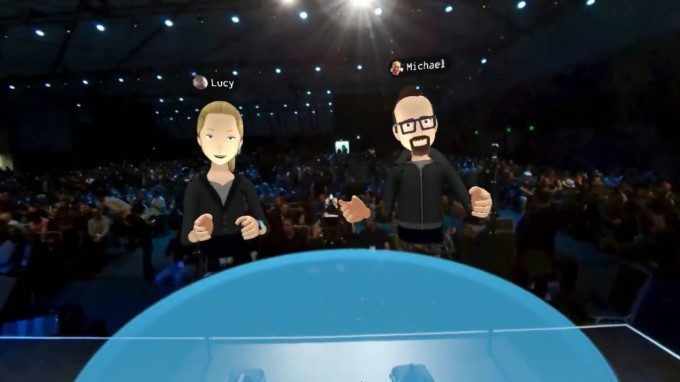A recent study by Facebook IQ, in which people completed one-on-one conversations in VR, concluded that most people respond positively, and introverts in particular feel more comfortable. Facebook IQ is a team established to assist marketers in understanding the way people communicate online and offline.
Facebook has been exploring the potential of social VR since their famous acquisition of Oculus VR in 2014. More recently, they detailed the results of their social VR avatar experiments and are planning to launch a ‘social VR app’ very soon. A different social experiment was recently completed by Facebook IQ, an internal team who help businesses understand communication trends and advertising effectiveness – asking 60 people to have a one-on-one conversation, half of them being in person, and half being in a VR environment wearing the Oculus Rift.
Interestingly, they didn’t use the VR avatars seen in Facebook’s own demonstrations, nor did they use the Oculus avatars found in the Rift’s menus – instead they used vTime, a popular ‘sociable network’ app available for Rift, Gear VR, Cardboard and Daydream. vTime uses its own full-body avatar system, complete with automatically-animating hands – surprising that these would be used in such an experiment. However, it seems like the main reason for choosing the software was to use its comfortable ‘train cabin’ environment – a familiar and natural place to converse with a stranger – and the focus of the experiment was about vocal communication.
 Applied neuroscience company Neurons Inc was commissioned to assist with the study of cognitive and emotional responses; all participants wore high resolution electroencephalography (EEG) scanners, used to record electrical activity in the brain, and eye trackers. With half the group conducting a normal one-to-one conversation in person, and the other half engaged in vTime, Neurons Inc was able to compare the level of comfort and engagement of a VR conversation compared to a conventional one. The eye trackers helped to determine the user’s level of attention, and the EEG scanners were used to assess motivation and cognitive load, based on the level of brain activity. If the load is too low, it means the person is bored; too high and they’re stressed.
Applied neuroscience company Neurons Inc was commissioned to assist with the study of cognitive and emotional responses; all participants wore high resolution electroencephalography (EEG) scanners, used to record electrical activity in the brain, and eye trackers. With half the group conducting a normal one-to-one conversation in person, and the other half engaged in vTime, Neurons Inc was able to compare the level of comfort and engagement of a VR conversation compared to a conventional one. The eye trackers helped to determine the user’s level of attention, and the EEG scanners were used to assess motivation and cognitive load, based on the level of brain activity. If the load is too low, it means the person is bored; too high and they’re stressed.
According to the report published on Facebook Insights, the participants, who had mostly never tried VR before, were within the ‘optimal range of cognitive effort’, being neither bored nor overstimulated. The cognitive load decreased over time, meaning that people naturally became more comfortable as the conversation progressed. In the interviews that followed, 93% said that they liked their virtual conversation partner, and those who were identified as more introverted responded ‘particularly positively’, being more engaged by meeting in VR than by meeting in person.
This increased confidence and reduced self-consciousness in introverts raises an interesting question about the current effectiveness of VR: did this occur because VR is already powerful, or not powerful enough? It seems that the main reason why introverts are less intimidated in VR is because it doesn’t feel as real as meeting someone face to face, and yet the entire industry is working towards making the experience as real as possible. What will happen when social VR reaches a level of fidelity that is much closer to meeting in person; are introverts only more engaged because of VR’s current limitations, or is there something unique to VR that introverts will remain attracted to, no matter how realistic it becomes?






